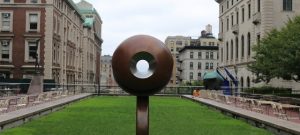 For this blog, I interviewed Esterah Brown, one of my close friends at Columbia who’s also a graduating senior, like me! Esterah is from Milwaukee, Wisconsin, and studies Political Science and History. As someone with experience only in neuroscience research, which is largely unpaid, when I first learned that Esterah gets paid for the research she does with two Columbia Political Science professors, I knew I had to interview her for a blog post.
For this blog, I interviewed Esterah Brown, one of my close friends at Columbia who’s also a graduating senior, like me! Esterah is from Milwaukee, Wisconsin, and studies Political Science and History. As someone with experience only in neuroscience research, which is largely unpaid, when I first learned that Esterah gets paid for the research she does with two Columbia Political Science professors, I knew I had to interview her for a blog post.
Rhea: So, Esterah! What type of research do you do?
Esterah: I do political science research for Professors Brigitte Nacos and Robert Shapiro, who are both professors in Columbia’s political science department. I’m one of three paid research assistants and I mainly work on two long-term research projects. The first project is researching public opinion on conspiracy theories, so I collect and track polls about popular conspiracy theories like QAnon, election fraud, and COVID vaccine conspiracies. The ultimate goal is to see to look at the polls through a demographic lens, but also to see how the results change over time. Do more people know about QAnon now than they did at this time last year? That’s kind of the questions we try to answer. My second project is also related to conspiracy theories, and for it, I look through the top 5 read US newspaper and do key-word searches for specific conspiracy theories. I then list every single article that mentions the theory from a set period of time.
Rhea: What was the selection process like for the position?
Esterah: It was actually pretty informal. I had a class last semester with Professor Nacos and I knew she had taken on some research assistants who were getting paid. I didn’t have prior poli-sci research experience at Columbia but all of the internships I’ve done have been research based. Also, the class I took with Professor—– ended with a big research project, so after reviewing that, I think she knew that I was capable of handling the work for this position.
Rhea: You know, it’s so rare to hear about an undergrad getting paid to do research. Is there a specific reason that this position was?
Esterah: Yeah, it’s strange because I think that prior to getting this position, I would’ve expected a position at the econ department or medical campus to be paid. I think in this case, it’s specifically these professors who wouldn’t take me on as an assistant unless they were able to afford paying me. Throughout college, I worked at Avery and I got paid to do that. And though I gained skills at Avery that I could apply to future position, I definitely gained more skills that were applicable to what I wanted to pursue post-grad through research. By Columbia not paying a majority of their undergraduate research assistants, it really discourages people from pursuing any sort of career in academia. That’s especially true for low-income students. So when so many research opportunities aren’t paid, it’s really discouraging for low-income students who have to make this choice that others don’t.
Rhea: What would you suggest to somebody who wants advice on getting a paid research gig?
Esterah: Work-study is obviously an option, but for some reason, doing research as work-study never seems to work out for me. There are fellowships and funding options for unpaid research, but I would actually suggest starting out by taking on unpaid research. Don’t commit a lot of your time for it, maybe just 5-10 hours so nothing crazy like 15-20 hours. At least that way you can gain some of those research skills before a paid opportunity shows itself, and maybe do the unpaid research at the same time as a paid job at Columbia, which you can look for on handshake. It might not be as academic, but you’ll still gain skills in Excel and some of those more administrative skills.
